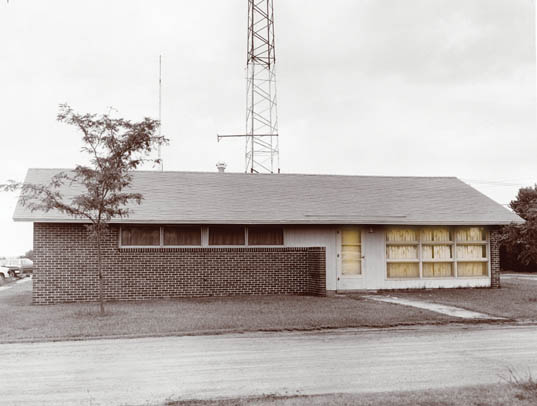
From its modest, yet confident beginnings at the University of Wichita’s Research House in 1958, to its national stature today, the Hugo Wall School of Urban and Public Affairs has been all about the right people, the right place and the right time.
Based on the vision of its namesake — a civic reformer born at the turn of the 20th century in rural Kansas who believed in good citizenry, good government and how a university could impact both — the Hugo Wall School has become a well respected resource for research on issues related to local and state government and communities, for training and professional development of government officials, and for educating would-be public administrators.
The school, which is home to the Center for Urban Studies, the Kansas Public Finance Center and the Master of Public Administration degree, has proven its worth many times over.
“There are two real distinct advantages to the Hugo Wall School,” says Sedgwick County Manager Bill Buchanan, who’s been a supporter and client of the school’s research services, as well as an adjunct professor. “The mission of the center has been to connect to the community, and we have some of the best experts in the country to help us.” The school’s second advantage is its graduate education, which, he says, “helps with the sustainability of government organizations.”
The success of the Hugo Wall School can be seen in public finance policy changes; in local issues such as the Wichita public school district’s decision to end busing for desegregation and the formation of Sedgwick County’s Nonprofit Chamber of Service, both of which were based on research conducted at the center; and it can be seen in the numerous graduates who populate many city and county payrolls.
Successful Alumni
Even a short list of successful Hugo Wall alumni is long and ranges from nearby grads such as Wichita police chief Norman Williams ’86/00, Derby, Kan., city manager Kathy Sexton ’89/92 and newly hired WSU government relations executive director Andy Schlapp ’92, to such far-flung alums as Nancy Brewer ’86/90, finance director for the city of Corvallis, Ore., and Jinxi Jia ’00, owner of PacRim Inc., who splits his time between Vancouver, Canada, and China.
Many of the more than 450 Hugo Wall School graduates hold positions in Kansas with state and local governmental agencies, with nonprofit organizations, or in the private sector, says George Platt, associate professor emeritus of the school.
But others, he adds, are scattered throughout the United States. For example: Kim Grant ’89, grants administrator, city of Arvada, Colo.; Gary Hamer ’96, capital planning manager, city of Tulsa, Okla.; Brian Hufford ’82, attorney, New York, N.Y.; Kelly Humphries ’80/86, senior public affairs specialist, and Mike Read ’90, project manager, NASA, Houston, Texas; Shaunna Johnson ’99, city administrator, Waite Park, Minn.; Bruce McCandless ’82, assistant city manager, Billings, Mont.; Flo McLeish ’99/00, Cumberland Township manager, Gettysburg, Pa.; Trix Niernberger ’77/79, executive director of the National Association on Mental Illness for the state of New York, Albany, N.Y.; Clemencia Prieto ’77/80, senior administrator, YWCA El Paso del Norte Region, El Paso, Texas; and Ade Williams ’85/87, director of business development and procurement, city of Dallas, Texas. (The grad years listed above cover all degrees from WSU, not only those awarded by the Hugo Wall School.)
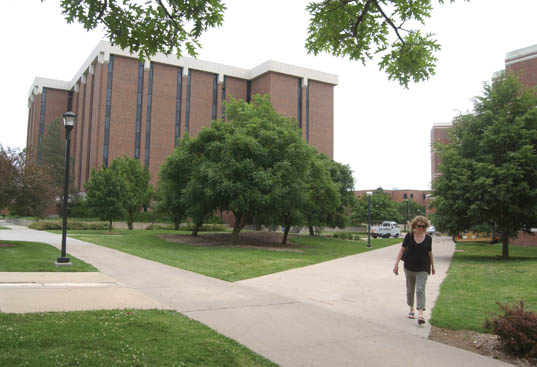
is part of the Fairmount College of Liberal Arts and
Sciences, and includes the Center for Urban Studies
and the Kansas Public Finance Center. The school
has been housed in Lindquist Hall since 1977.
Wall School Beginnings
Originally begun in 1958 as the Center for Urban Studies to provide service to local governments through research and to train public officials, the Hugo Wall School expanded its research to state government and then to graduate education in the mid-1970s. In the late 1970s, it created an extensive professional development program that has trained hundreds of city and county managers, city clerks and other officials — whether elected, appointed or hired — to become better leaders and public servants.
Hugo Wall believed the first three words of the U.S. Constitution — “We the People” — provided the basis to good citizenship and good government, according to one published account of his career. He also believed in a maxim of one of his political science contemporaries (that of Hubert Humphrey Jr., who later was a U.S. vice president): faculty should “participate and perform.”
With those beliefs, Wall became a pioneer in championing the idea that universities and colleges should educate students to become better citizens, offer training to public servants and work closely with local governments. It was a combination of Wall being in the right place at the right time, mixed with his ability to be patient when instituting change, that led to the formation of one of WSU’s most successful research centers.
Wall, who earned his doctorate in political science at Stanford, returned to his home state in 1929 to teach at the University of Wichita. WU had just a few years earlier become a municipal university, supported primarily by city taxpayer money. Wall believed that as a municipal university, WU had a special responsibility to respond to the needs of the community supporting it. That belief, coupled with the nationwide movement for more professionalism in local government and Wall’s own manager-style approach to local governance, led him to begin studying institutes and centers emerging at other colleges that were effecting positive changes in the quality of government.
In a proposal sent to WU President Harry Corbin ’40, one of Wall’s former students, in October 1956, Wall and three of his colleagues — Donald Cowgill, sociology; Arthur Wichmann, economics; and James Sours ’49, political science — outlined an interdisciplinary center that would have four purposes: to conduct independent research in community and/or area public affairs, such as public finance, public administrations, schools and social welfare; to conduct clinics, workshops and other training; publish research; and supplement graduate education. All have since become hallmarks of the center.
The new Center for Urban Studies opened in 1958 in Research House, a small prototype building located where the current Campus Credit Union now sits. It had been built by the university’s Engineering Research Corp. and the Coleman Co. to test heating and cooling units for small post-World War II houses.
A year later, the center held its first conference, “Seminar in Police Administration.” By 1961, it completed its first study, “The Image of Downtown Wichita,” which included research on women’s shopping habits and perceptions in Wichita.
With the municipal university in financial crisis, the center was temporarily suspended in 1963. It was revived in 1965, a year after WSU became a state university. Again, it was a matter of the right time. When WSU entered the state system in 1964, Wichita voters had agreed to provide mill levy support to retire the former municipal university’s debt, to provide a lasting endowment and to expand WSU’s urban mission. With its focus on urban and public affairs, the center was a logical recipient of funding.
After spending time as an administrator, including as vice president of academic affairs, Wall became the center’s director from 1966 until 1971. During that time, the center hosted a number of conferences and continued publications, fulfilling some of Wall’s key purposes for the center. But more needed to be done.
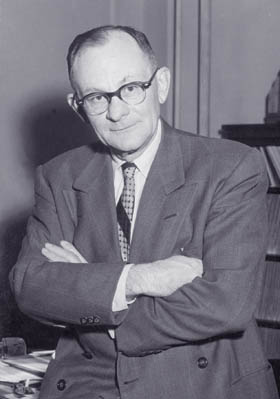
professionalism in public administration.
Public Administration
The late 1960s brought political and urban turmoil, with the assassinations of Martin Luther King Jr. and Bobby Kennedy, the escalating war in Vietnam and anti-war demonstrations and race riots. During this volatile time, Glenn Fisher was a young economics professor at the University of Illinois; he got a call from Paul Magelli, dean of WSU’s Fairmount College of Liberal Arts and Sciences, to see if he’d be interested in the new Regents Professor of Urban Affairs position at WSU.
“I was an economist specializing in state and local finance who through an unusual set of circumstances had become a professor of political science,” Fisher says. “I knew that neither economists nor political scientists had the answer to burning cities or university demonstrations, but I believed that a university faculty, working together, could make a contribution to understanding what was going on.”
WSU President Clark Ahlberg ’39, another of Wall’s protégés who later joined the center’s faculty, “made clear” to Fisher that his first job at WSU would be establishing an interdisciplinary Master of Urban Affairs degree. In 1974, WSU conferred the first MUA degree; a decade later the degree was changed to the Master of Public Administration.
Over the course of the next three decades, the center started making its mark and fulfilling more of the vision Wall had had. Joe Pisciotte, who’d known Fisher as a colleague at the University of Illinois, became director of the center in 1977, when it moved into Lindquist Hall. More faculty were recruited, becoming the trusted experts Buchanan and other government leaders, such as longtime Wichita Mayor Bob Knight ’70, would count on for key issues.
Faculty such as Ed Flentje, a former Kansas secretary of administration, and George Platt, who had urban planning experience, could be found in the classroom. Nancy McCarthy Snyder joined the faculty with expertise in social welfare that naturally progressed to research interests in nonprofit management as more government services began to be carried out by nonprofits.
In 1983, WSU paid homage to the center’s founder by rededicating the center as the Hugo Wall Center for Urban Studies. Ten years later, the center and its MPA degree were merged with the programs in administration of justice, social work, gerontology and ethnic studies to become the Hugo Wall School of Urban and Public Affairs, housed within the Fairmount College of Liberal Arts and Sciences. By 1999, the school had been split into three entities, with the Center for Urban Studies, the Kansas Public Finance Center and the MPA degree remaining as the Hugo Wall School of Urban and Public Affairs.
By attracting and then keeping researchers, such as W. Bartley Hildreth, a nationally recognized public finance expert who joined the faculty in 1994 as Regents Professor of Public Finance, the school has been able to carry out Wall’s belief that faculty should “participate and perform.” Pisciotte, for example, was a Wichita city councilman, while Sam Yeager, a public administration professor, was involved in many campus and community committees. Hildreth and John Wong, another state finance expert, have served on various governor’s task forces and groups.
Mark Glaser ’71/74, the school’s first graduate, returned to Wichita in the 1990s to research community-related issues, including how Wichita perceives its public schools, which helped the district pass its $284.5 million bond proposal in 2000, and how the school could involve the community in such strategic issues as eliminating busing for desegregation purposes.
In the past decade, the school has earned accreditation from the National Association of Schools of Public Affairs and Administration and has created four graduate certifications — public finance, economic development, city and county management, and nonprofit management — within the MPA degree.
With the school’s active professional development programs, faculty carrying out key research, and alumni engaged in community service and government, Wall’s vision, forged more than a half-century ago, is flourishing.
Historical Photos Courtesy Wichita State University Libraries Speical Collections
The Timeline
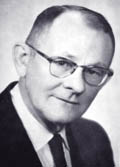
1929: Hugo Wall, a 28-year-old Inman, Kan., native having just received a Ph.D. from Stanford University, joins the political science faculty at the Municipal University of Wichita.
1947: After researching governmental research bureaus at other universities, Wall develops a proposal for a similar center at WU but is unsuccessful due to lack of local political and financial support.
1956: After a successful interdisciplinary approach to start the Social Science Research Institute, Wall; Donald Cowgill, sociology; Arthur Wichmann, economics; and James Sours, political science; send a prospectus to President Harry Corbin for a Bureau for Research in Public Affairs.
1958: The Center for Urban Studies opens in Research House on campus.
1959: The center holds its first conference, “Seminar in Police Administration,” in July; followed in 1961 with publication of its first research report, “Image of Downtown Wichita,” by Samuel Ostertag.
1963: The center is temporarily suspended, in part because of the municipal university’s financial crisis.
1965: After WSU becomes a state-supported institution, the center is revived, funded by city mill levy support to retire WU’s debt, to provide a lasting endowment for the university, and to support an expanded “urban mission.”
1966: Wall steps down as an administrator to lead the center until he retires from university service in 1971. He dies in 1975.
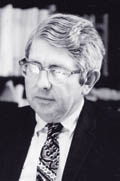
1970: Glenn Fisher joins the political science and economics faculties as WSU’s first Regents Professor of Urban Affairs and is instrumental in crafting the Master of Urban Affairs degree.
1974: The first MUA degree is awarded to Mark Glaser, a research associate and later a faculty member with the center.
1977: Joe Pisciotte is recruited to lead the center, which moves into the new Liberal Arts Building, later named Lindquist Hall.
1979: Faculty from the political science and economics departments with a primary interest in public administration are re-assigned to the Center for Urban Studies, reporting to the Graduate School.
1983: On May 3, in a city-proclaimed recognition of Hugo Wall Day, the center is renamed Hugo Wall Center for Urban Affairs to carry the name of its founder.
1984: The MUA degree is replaced by the Master of Public Administration. Clark Ahlberg, who was mentored by Wall, retires as WSU president to join the center and its faculty as University Professor.
1987: Former Kansas Gov. John Carlin, term-limited after eight years in office, joins the center for an 18-month appointment as visiting professor of public administration and international trade.
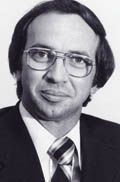
1989: Ed Flentje becomes the new center director.
1993: The Hugo Wall School of Urban and Public Affairs is formed as part of the Fairmount College of Liberal Arts and Sciences. The center and departments of administration of justice, minority studies, social work and gerontology comprise the school, which is led by Pisciotte. Fisher retires.
1994: The center maintains the Regents Professorship appointment, with W. Bartley Hildreth recruited as the Regents Distinguished Professor of Public Finance. He establishes the research-oriented Kansas Public Finance Center within the center.
1999: The Hugo Wall School is reconfigured, resulting in the School of Community Affairs, housing the criminal justice, ethnic studies and gerontology programs; the School of Social Work; and the Hugo Wall School, which retains the name and houses the MPA program, Center for Urban Studies and the Kansas Public Finance Center. Flentje is the new director.
2007-08: In summer 2007, Pisciotte retires, Flentje announces he will step down as director in 2008, but takes a leave of absence in January 2008 to become Wichita’s interim city manager, and Hildreth is named interim dean of the W. Frank Barton School of Business, where he also holds an economics faculty appointment. John Wong, who joined the faculty in 1990, is appointed interim director, while a national search is conducted in spring 2008 for a new director.

While Hugo Wall planted the seeds for a successful research and education center at WSU that bears his name, he cultivated another passion — growing irises. It was a pastime that started for Wall and his wife, Dora, around 1950, about the time their youngest child, John, left for college in California. “I think they were looking for a hobby to do together,” John says. “They probably gravitated toward gardening because it was something they could do together.”
Eventually the Walls’ home south of the WSU campus, near 12th and Yale, and nearby vacant lots he purchased were landscaped with several iris beds. The Walls shared rhizomes with family and friends. One of Hugo’s favorite gestures was to welcome new faculty to the WSU and Wichita communities with a gift of rhizomes. That generosity didn’t surprise John Wall. “That was very characteristic of the kind of man my father was,” he relates. He and his children have continued that generosity, sharing the rhizomes dug up from the Walls’ home in Wichita with friends and neighbors in Malibu, Calif., Salt Lake City and elsewhere.
The Walls were involved in hybridizing irises. Hugo was attempting to breed a pure red iris, while Dora was trying to achieve a pure white iris. Hugo eventually registered four irises with the American Iris Society; Dora registered seven. He also served as president of the society in 1971, the same year he retired from WSU. His “energetic leadership” was instrumental in raising funds for the American Iris Society Foundation, which promotes research on irises, according to the foundation’s website.
As part of its 50th anniversary celebration this spring, Wichita State’s Hugo Wall School of Urban and Public Affairs dedicated an iris bed in his honor.
One of Wall’s former students, Kathryn Griffith, recalled receiving irises from Wall in the 1950s when she went to work in President Harry Corbin’s office, and Justus Fugate, whose parents were friends of the Walls, donated rhizome descendents from Wall for the new WSU garden, located south of Hubbard Hall, between Jabara and Lindquist halls.





